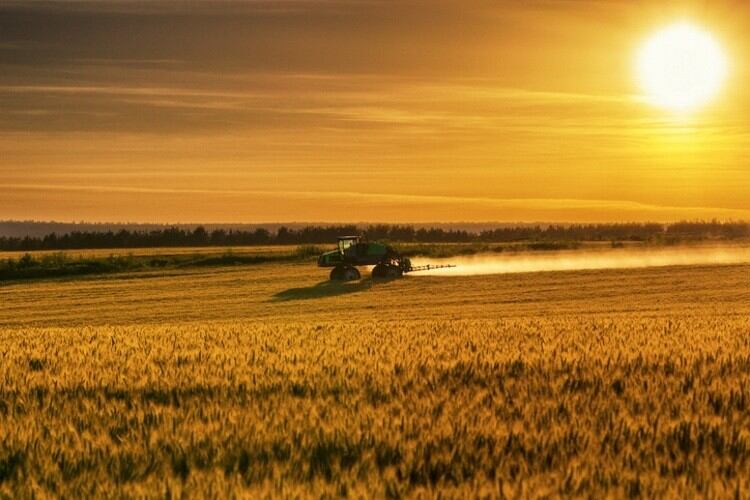When the United Nations launched the Sustainable Development Goals five years ago, the global community rallied around the ambition to achieve zero hunger by 2030. Since then, world hunger has continued to rise. According to a report released this year by the FAO, almost 9% of the global population is now undernourished. Climate variability has been cited as a leading factor undermining efforts to improve access to nutrition.
This is only set to get worse. New research published in Global Change Biology suggests that the negative impact of climate change will more than wipe out any crop yield gains that are likely to result from increased availability of CO2 in the atmosphere, adding to the challenge of providing adequate nutrition for a growing global population.
Predicting changes to crop yields
Over the past 30 years, a network of 14 long-term research facilities spanning five continents has simulated future levels of CO2 to forecast the impact on crops. These 'Free-Air Concentration Enrichment' (FACE) experiments are conducted outside in ‘real-world’ field conditions, an approach that the researchers suggest allows them to capture the ‘complex environmental factors that impact crop growth and yield’.
The newly published review, ‘To predict how crops cope with changing climate’, looks at 30 years of FACE data to forecast how global crop production may be impacted by rising CO2 levels and other factors.
"It's quite shocking to go back and look at just how much CO2 concentrations have increased over the lifetime of these experiments," said co-author Lisa Ainsworth, a research plant physiologist with the US Department of Agriculture, Agricultural Research Service (USDA-ARS).
"We are reaching the concentrations of some of the first CO2 treatments 30 years back. The idea that we can check the results of some of the first FACE experiments in the current atmosphere is disconcerting."
Under non-stress conditions, the researchers predicted crops that are less efficient at converting CO2 and sunlight into energy – including soybean, cassava, and rice – are likely to see an 18% increase in yields when CO2 levels increase by 200 parts per million (ppm). Legumes and root crops showed a greater increase and cereals less-so, the paper found.
"So should we anticipate a bounty as CO2 rises?" asked co-author Stephen Long, Ikenberry Endowed University Chair of Crop Sciences and Plant Biology at the University of Illinois and a member of the Carl R. Woese Institute for Genomic Biology.
"Sadly not because rising CO2 is the primary cause of change in the global climate system. The anticipated 2°C rise in temperature, caused primarily by this increase in CO2, could halve yields of some of our major crops, wiping out any gain from CO2."
Nitrogen deficiency reduced the average yield increase to 10%, as did warming of around 2°C.
The quality, as well as the quantity, of yield was also impacted. The researchers concluded CO2 increases resulted in important nutritional losses. Many crops showed lower mineral nutrient and protein contents, they noted.
Meanwhile, crops produced under higher levels of atmospheric CO2 are ‘considerably’ more vulnerable to pests and diseases.
These factors outweigh any productivity gain that the global agricultural system could see as more CO2 is released into the atmosphere, the study concluded.
"Lots of people have presumed that rising CO2 is largely a good thing for crops: assuming more CO2 will make the world's forests greener and increase crop yields," Ainsworth said. "The more recent studies challenge that assumption a bit. We're finding that when you have other stresses, you don't always get a benefit of elevated CO2."
The need to ‘future proof’ agriculture
Building a more sustainable agri-food supply would be best achieved through a swift move to net zero emissions that limits the amount of CO2 released into the atmosphere, Long noted.
"The ideal solution will be that we dramatically decrease our release of CO2 into the atmosphere and quickly achieve carbon neutrality," Long said.
However, this alone may not be enough. The plant biologist suggested that plant breeding and genetic engineering should be leveraged to develop more resistant varieties. "We also need to take out an insurance policy against [net zero] not being achieved. That is, we need to breed and engineer future-proof crops and systems that can be sustainable and nutritious under the combined changes in atmospheric composition and climate to help realize the goal of zero hunger."
He warned that while there are ‘likely’ genetic solutions, ‘time is short’.
The authors show that there is sufficient genetic variation within our major crops to overcome some of these negative effects and capitalise on the yield benefit of higher CO2. "Where genetic variation is lacking, there are some bioengineering solutions with one already demonstrated to prevent yield loss when the temperature is raised with CO2," Long said. "But, given the time taken to develop new crop cultivars, this potential could only be realised if we start now."
Researchers should explore a wider variety of crops and genotypes as well as different management practices, such as seeding density, tillage, and cover crops, to find other solutions that are 'less burdensome' on the environment, Ainsworth added.
Source
'30 years of free‐air carbon dioxide enrichment (FACE): What have we learned about future crop productivity and its potential for adaptation?'
Global Change Biology
DOI: 10.1111/gcb.15375
Authors: Elizabeth A. Ainsworth, Stephen P. Long.

